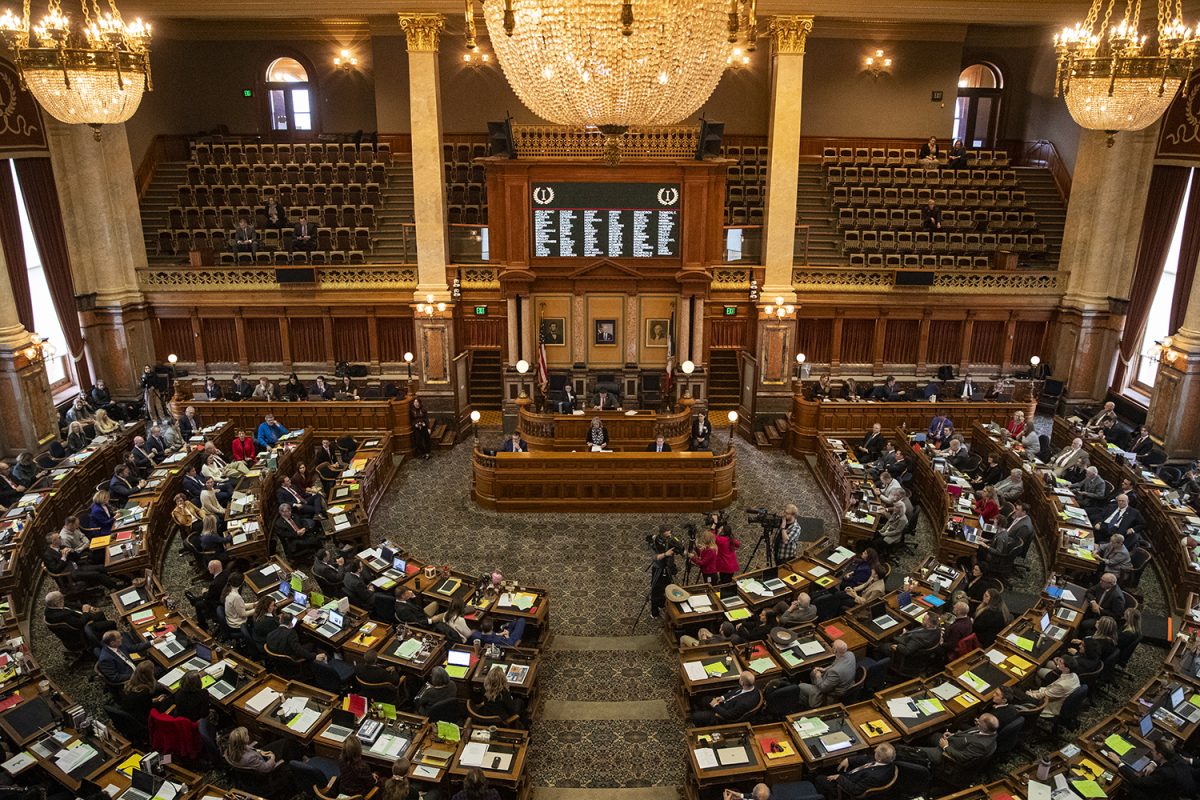As lawmakers move toward adjournment this weekend, Senate lawmakers advanced a tax omnibus bill that would, among other changes to tax processes, decrease the state’s income tax rate to 3.8 percent by next year.
The state’s tax rate is already set to decrease to 3.9 percent by 2026, due to a 2022 Iowa law signed by Iowa Gov. Kim Reynolds, but after better-than-expected revenues in fiscal 2023 lawmakers moved to expedite cuts.
The Senate Ways and Means Committee, the committee in charge of tax policy, advanced the bill to the floor Thursday with a handful of Democrats opposing the measure.
Speeding up property tax cuts is a priority for Iowa Republican Gov. Kim Reynolds and legislative republicans, however, earlier this session Senate Republicans and the governor could not agree on the new rate.
The most recent proposal seems to have consensus with the House and Senate introducing and advancing companion tax proposals on Thursday.
The 3.8 percent tax rate falls short of the governor’s original proposal of 3.65 percent for 2024 and 3.5 percent for 2025.
Reynolds signaled her support for the proposal in a statement provided to members of the media on Thursday.
“This was a key piece of the tax reform bill I proposed this year, and this common-sense compromise will allow hard-working Iowans to keep more of what they earn in every paycheck,” Reynolds said in a statement. “Government should collect only what it needs to serve its people and allow them to keep the rest.”
House and Republican lawmakers have expressed support for eliminating the state income tax.
Sen. Dan Dawson, R-Council Bluffs, said the proposal is a middle point to ensure lawmakers don’t cut taxes too fast, impacting future revenues without enough time to study the effects.
“This allows the broader body to have further conversations on cutting those taxes, as well as keep some money in reserve,” he said.
Democrats said they support a number of the proposals, namely the proposal to adjust growth calculations for cities and counties but are worried about the income tax cuts and how they will affect Iowa’s middle class.
“We still have not had time to really decipher and figure out from the runs how the how the income tax portion is going to affect middle-and working-class Iowans,” Senate Minority Leader Pam Jochum, D-Dubuque, said during debate on the bill in the Senate Ways and Means Committee Thursday.
The bill would use Taxpayer Relief Funds and the state’s year-end surplus to cover state shortfalls in revenue.
That part of the bill would be repealed on July 1, 2029.
The state ended fiscal 2023 with $2.74 billion in the Taxpayer Relief Fund, and the amount is expected to rise to $3.6 billion in July when the fiscal year ends.
Property tax tweaks
The bill also makes changes to a property tax law, House File 718, passed in 2023 that limits how much city and county property tax revenue can grow.
Under the current law if a city or county’s total assessed property level grows more than 3 percent it must reduce the overall property tax levy, with a tiered required reduction in levy or rollback based on the percent of overall growth.
The bill changes the tiers reducing the amount of rollback for the different tiers of growth leaving cities with greater property tax revenue.
County Compensation Boards
The bill would give counties the ability to repeal county compensation boards, the county board’s that recommend salary increase to local county board of supervisors.
Iowa law requires the board annually review salaries for county supervisors, auditors, treasurers, treasurers, recorders, sheriffs, and county attorneys by comparing the salaries to comparable positions in other sectors and counties.
However, county board of supervisors may not raise it above the recommended level by the county compensation board, and if it approves raises lower than recommended it must do so by an equal percentage for all officials.
Previous legislative efforts to repeal county compensation boards this session have not survived funnels and have failed to gain consensus.



